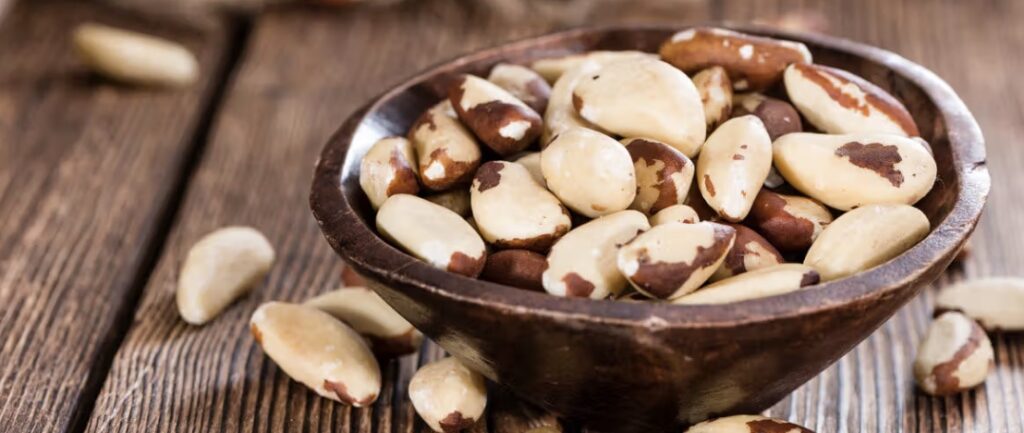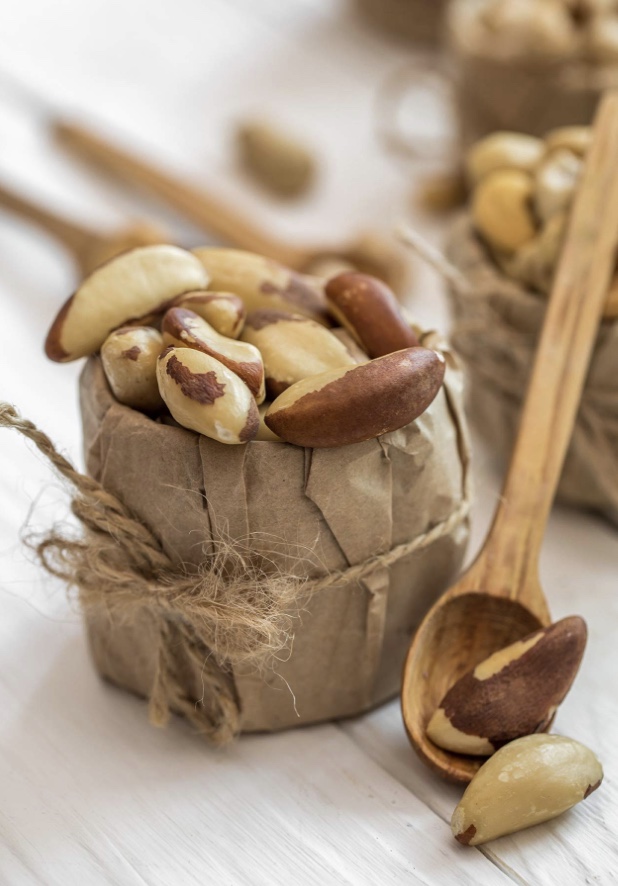Brazil nuts, often overlooked compared to almonds or cashews, are gaining popularity thanks to their incredible health benefits and growing recognition on platforms like TikTok. These large seeds from the Bertholletia excelsa tree, native to the Amazon rainforest, are packed with essential nutrients, including selenium, magnesium, zinc, and healthy fats, making them a powerhouse in nutrition. Their buttery texture and versatility allow them to fit into everything from smoothies and salads to plant-based milk alternatives.

Nutritional and Health Benefits:
Brazil nuts are particularly prized for their high selenium content, a mineral that supports thyroid function, immune health, and metabolism. Just one nut contains enough selenium to meet the daily recommended intake, which can help regulate weight, boost mood, and protect against diseases like heart disease and cancer. They are also rich in magnesium, which promotes restful sleep and bone health, and contain antioxidants like ellagic acid, known for supporting brain health and preventing neurodegenerative disorders. Omega-3 and omega-6 fatty acids in these nuts contribute to heart health by lowering LDL cholesterol and stabilizing blood sugar levels.
A serving of three Brazil nuts contains:
- Calories: 99
- Protein: 2.15 g
- Fat: 10.06 g
- Carbohydrates: 1.76 g
- Fiber: 1.10 g
- Phosphorus: 109 mg
- Potassium: 99 mg
- Selenium: 288 mcg
- Magnesium: 56 mg
- Calcium: 24 mg
- Zinc: 0.61 mg
- Iron: 0.36 g
- Sodium 0 mg
Sustainability and Environmental Impact:
Opting for Brazil nuts can also support environmental sustainability. Their production encourages the preservation of the Amazon rainforest, offering local communities an incentive to protect these towering trees, which grow in countries like Brazil, Bolivia, and Peru. Choosing Brazil nuts over almonds, which require significant water resources, can be a more eco-conscious decision.
Consumption Tips and Precautions:
Despite their benefits, it’s important to limit Brazil nut intake to 3–5 nuts per day to avoid excessive selenium, which could lead to toxicity. These nuts are also highly perishable, so storing them in the refrigerator helps maintain freshness. Beyond eating them plain, they can be added to smoothies, oatmeal, salads, or even used to make Brazil nut milk or energy balls for a nutrient-dense snack.

How to Make a Brazil Nut Milk
Brazil nuts can be transformed into a variety of products, including oil, butter, or a rich plant-based milk that’s similar to cashew milk. This homemade milk is perfect for smoothies, coffee, or matcha lattes, and it’s quick and easy to prepare at home.
Ingredients:
- 1 cup Brazil nuts (soaked)
- 3 cups water
- 1 drop of maple syrup
- A pinch of salt
Instructions:
- Add the soaked Brazil nuts, water, maple syrup, and salt into a blender.
- Blend the mixture until smooth and well-combined.
- Strain the liquid through a cheesecloth into a bowl to remove any solids.
- Pour the milk into a sealed glass bottle and refrigerate. It will stay fresh for up to six days.
This creamy Brazil nut milk makes a versatile addition to your drinks and recipes!
With their unmatched nutritional profile, Brazil nuts offer a delicious way to improve health while contributing to environmental conservation—just be mindful not to overindulge!
EUROPEAN PERSPECTIVE
The Benefits of Brazil Nuts
Brazil nuts are packed with nutrients and shouldn’t be judged solely by their calorie count and fat content.
Selenium Superstars
Brazil nuts are the richest source of selenium, an essential and often hard-to-find mineral in our diets. Consuming just one Brazil nut per day meets the daily selenium requirement, which plays a crucial role in reducing inflammation, supporting cell growth, maintaining thyroid function, and boosting the immune system. Research shows that low selenium levels are linked to a higher prevalence of thyroid diseases.
Nutrient-Rich
In addition to selenium, Brazil nuts are high in copper, with a ¼ cup providing about 70% of the daily recommended intake. Copper aids immune defense, collagen formation, cellular protection from free radicals, and energy production. They also contain other essential vitamins and minerals such as:
- Vitamin B1 (Thiamine): Supports energy metabolism and nerve function.
- Vitamin E: Acts as an antioxidant and boosts the immune system.
- Magnesium: Essential for muscle function and maintaining heart rhythm.
- Phosphorus: Important for tissue formation and energy release.
- Manganese: Activates enzymes and aids in connective tissue formation.
- Zinc: Involved in DNA/RNA synthesis, wound healing, and immune defense.
Anti-Inflammatory Properties
Brazil nuts contain antioxidants like vitamin E, selenium, and polyphenols, which help reduce inflammation and oxidative stress, potentially protecting against neurodegenerative diseases and contributing to overall longevity.
Cardiovascular Health
Regular consumption of Brazil nuts can support heart health by lowering bad cholesterol levels and regulating heart rhythm due to their high levels of antioxidants, fiber, selenium, copper, and magnesium.
Bone Health
Magnesium, manganese, and phosphorus in Brazil nuts are vital for maintaining and building bone density.
Caution
Due to their high selenium content, excessive consumption of Brazil nuts can lead to toxicity. It is generally recommended to limit intake to 2-3 nuts per day for safety.
sources:



